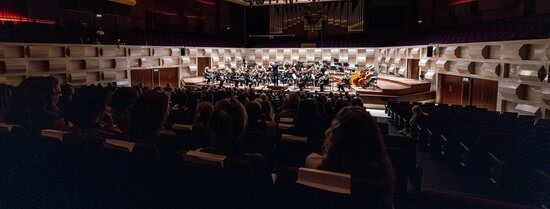There is no doubt that people enjoy music. However, not everyone enjoys the same music or does so in the same way. And what effect does it have on human well-being? To investigate this, Erasmus University Rotterdam, Erasmus MC and the Rotterdam Philharmonic Orchestra (RPhO) have joined forces. Together, they surveyed the experience of live music among more than 500 visitors to special concerts at De Doelen in Rotterdam.
Spread over a Saturday in May and a Sunday in June, hundreds of residents of the city of Rotterdam visited De Doelen to attend a pop concert and a classical concert. In the process, they were asked numerous questions about their social background, musical preferences and what they thought of the music, but they were also given heart rate monitors so that the researchers could discover what live music does to the human body.

How people experience music varies widely
'This has made me incredibly emotional. I’ve been a huge fan of Wham! and George Michael for years. To hear Faith being performed by such a great band is amazing!', a visitor told researcher Julian Schaap after the pop concert at De Doelen. Other visitors preferred the performance of Mozart's 40th Symphony (first movement) by the full Rotterdam Philharmonic Orchestra, led by conductor Bertie Baigent. 'Really beautiful, such incredible music', said another visitor. 'I know it from films, but I’d never seen and heard it like this in real life.' The statements exemplify how much music preferences and the way people experience music can vary between people.

The impact of live music on your mental and physical well-being
'We know that music can play a role in improving human well-being, mentally, physically and socially. But we actually still know very little about the impact of live music and how different types of live music affect well-being', says head researcher Julia Peters.
Researcher Julian Schaap of Erasmus School of History, Culture and Communication: 'We are particularly interested in the interaction between the social and the physical. What our Erasmus MC colleague Markus Klimek calls the bio-psycho-social approach. You can really only examine this properly by combining the sample size of sociology with sociological and psychological questionnaires and physical measurement tools such as heart rate monitors. That is why it became such a huge experiment.'

Does music create calm or stress?
So what exactly do these heart rate monitors measure? Julia Peters: 'Our heart rate reveals a lot about our physical and, indirectly, mental state. First, we measure heart rate variability, which is the variation in time between heartbeats. This provides insight into the state of our autonomic nervous system: does certain music put certain people in a state of rest and recovery, or rather of stress and lowered resistance? We also look at heart rate synchronisation. We know that people's bodies can get into a collective rhythm during concerts. When dancing, this is very obvious, but this also takes place on much more subtle levels. Possibly also in the audience's heart rhythms.'
More music in the care sector
For the study, cultural sociologists from Erasmus University Rotterdam are collaborating with the Music as Medicine research group at Erasmus MC and the Rotterdam Philharmonic Orchestra. The study was financially supported through an Innovation Labs grant from the Taskforce for Applied Research SIA. The intention is not only to derive scientific knowledge from the experiment but also – for example – to gain important insights for the cultural sector and specifically the RPhO. If the research shows that live music can indeed increase our well-being, it presents opportunities for the cultural sector to move more into the field of health care. Examples include live music in hospitals, sheltered workshops and hospices. 'A collaboration like this is really unique', says Julian Schaap, 'not only because we are joining hands to set up a big experiment from different disciplines, but also because the outcomes of the research can find a way directly towards the cultural sector.'
- Researcher
- Researcher
- Related content

